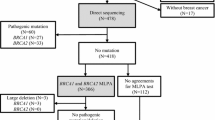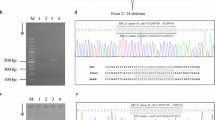Abstract
Triple-negative breast cancer (TNBC) accounts for 12–24 % of all breast cancers. Here, we studied 221 familial breast and/or ovarian cancer patients from 37 hospitals using a comprehensive approach to identify large genomic rearrangements (LGRs) as well as sequence variants, and investigated the association between BRCA1/2 mutational status and TNBC. We performed direct sequencing or mutation scanning followed by direct sequencing. Then, 143 BRCA1/2 mutation-negative patients were screened for LGRs. In this study, the prevalence of BRCA1/2 mutations was high (36.9 %). The prevalence of BRCA1 mutations was similar to that of BRCA2 mutations: 49.4 versus 50.6 %, respectively. TNBC was diagnosed in 35.2 % of BRCA1/2 mutation carriers and 57.1 % of BRCA1 mutation carriers. Conversely, two-thirds of TNBC patients carried BRCA1/2 mutation(s), and about half were BRCA1 mutation carriers. When stratified by the mutated gene, TNBC prevalence in BRCA1 mutation carriers was significantly lower when there was a family history of ovarian cancer. Our multinomial logistic regression model demonstrated that no single factor was sufficient, and at least two factors, such as a patient with family history of both breast cancer and ovarian cancer or a patient diagnosed at a relatively young age (<40 years) with a TNBC phenotype, are necessary to indicate BRCA1/2 genetic testing in this population. Our results suggest that TNBC is a strong predictor for the presence of a BRCA1 mutation in this population, but additional risk factors should also be evaluated to ascertain a 10 % or higher prior probability of BRCA1/2 mutation testing.
Similar content being viewed by others
Abbreviations
- TNBC:
-
Triple-negative breast cancer
- ER:
-
Estrogen receptor
- PR:
-
Progesterone receptor
- DHPLC:
-
Denaturing high-performance liquid chromatography
- SSCP:
-
Single-strand conformational polymorphism
- MLPA:
-
Multiple ligation-dependent probe amplification
- LGR:
-
Large genomic rearrangement
- F-CSGE:
-
Fluorescence-based conformation-sensitive gel electrophoresis
- IHC:
-
Immunohistochemistry
- FISH:
-
Fluorescence in situ hybridization
References
Rummel S, Varner E, Shriver CD, Ellsworth RE (2013) Evaluation of BRCA1 mutations in an unselected patient population with triple-negative breast cancer. Breast Cancer Res Treat 137(1):119–125
Rakha EA, Ellis IO (2009) Triple-negative/basal-like breast cancer: review. Pathology 41(1):40–47
Andres R, Pajares I, Balmana J, Llort G, Ramon YCT, Chirivella I, Aguirre E, Robles L, Lastra E, Perez-Segura P et al (2014) Association of BRCA1 germline mutations in young onset triple-negative breast cancer (TNBC). Clin Transl Oncol 16(3):280–284
Tun NM, Villani G, Ong K, Yoe L, Bo ZM (2014) Risk of having BRCA1 mutation in high-risk women with triple-negative breast cancer: a meta-analysis. Clin Genet 85(1):43–48
Walsh T, Casadei S, Coats KH, Swisher E, Stray SM, Higgins J, Roach KC, Mandell J, Lee MK, Ciernikova S et al (2006) Spectrum of mutations in BRCA1, BRCA2, CHEK2, and TP53 in families at high risk of breast cancer. JAMA 295(12):1379–1388
Mazoyer S (2005) Genomic rearrangements in the BRCA1 and BRCA2 genes. Hum Mutat 25(5):415–422
Seong MW, Cho SI, Noh DY, Han W, Kim SW, Park CM, Park HW, Kim SY, Kim JY, Park SS (2009) Low contribution of BRCA1/2 genomic rearrangement to high-risk breast cancer in the Korean population. Fam Cancer 8(4):505–508
Kim H, Cho DY, Choi DH, Choi SY, Shin I, Park W, Huh SJ, Han SH, Lee MH, Ahn SH et al (2012) Characteristics and spectrum of BRCA1 and BRCA2 mutations in 3,922 Korean patients with breast and ovarian cancer. Breast Cancer Res Treat 134(3):1315–1326
Seong MW, Cho SI, Noh DY, Han WS, Kim SW, Park CM, Park HY, Kim SY, Kim JY, Park SS (2009) Comprehensive mutational analysis of BRCA1/BRCA2 for Korean breast cancer patients and evidence of a founder mutation. Clin Genet 76(2):152–160
Richards CS, Bale S, Bellissimo DB, Das S, Grody WW, Hegde MR, Lyon E, Ward BE (2008) Molecular Subcommittee of the ALQAC: aCMG recommendations for standards for interpretation and reporting of sequence variations: Revisions 2007. Genet Med 10(4):294–300
Wolff AC, Hammond ME, Schwartz JN, Hagerty KL, Allred DC, Cote RJ, Dowsett M, Fitzgibbons PL, Hanna WM, Langer A et al (2007) American Society of Clinical Oncology/College of American Pathologists guideline recommendations for human epidermal growth factor receptor 2 testing in breast cancer. J Clin Oncol 25(1):118–145
Peshkin BN, Alabek ML, Isaacs C (2010) BRCA1/2 mutations and triple negative breast cancers. Breast Dis 32(1–2):25–33
Phipps AI, Buist DS, Malone KE, Barlow WE, Porter PL, Kerlikowske K, Li CI (2011) Family history of breast cancer in first-degree relatives and triple-negative breast cancer risk. Breast Cancer Res Treat 126(3):671–678
Carey L, Winer E, Viale G, Cameron D, Gianni L (2010) Triple-negative breast cancer: disease entity or title of convenience? Nat Rev Clin Oncol 7(12):683–692
Dawood S (2010) Triple-negative breast cancer: epidemiology and management options. Drugs 70(17):2247–2258
Fostira F, Tsitlaidou M, Papadimitriou C, Pertesi M, Timotheadou E, Stavropoulou AV, Glentis S, Bournakis E, Bobos M, Pectasides D et al (2012) Prevalence of BRCA1 mutations among 403 women with triple-negative breast cancer: implications for genetic screening selection criteria: a hellenic cooperative oncology group study. Breast Cancer Res Treat 134(1):353–362
Gonzalez-Angulo AM, Timms KM, Liu S, Chen H, Litton JK, Potter J, Lanchbury JS, Stemke-Hale K, Hennessy BT, Arun BK et al (2011) Incidence and outcome of BRCA mutations in unselected patients with triple receptor-negative breast cancer. Clin Cancer Res 17(5):1082–1089
Robertson L, Hanson H, Seal S, Warren-Perry M, Hughes D, Howell I, Turnbull C, Houlston R, Shanley S, Butler S et al (2012) BRCA1 testing should be offered to individuals with triple-negative breast cancer diagnosed below 50 years. Br J Cancer 106(6):1234–1238
Phuah SY, Looi LM, Hassan N, Rhodes A, Dean S, Taib NA, Yip CH, Teo SH (2012) Triple-negative breast cancer and PTEN (phosphatase and tensin homologue)loss are predictors of BRCA1 germline mutations in women with early-onset and familial breast cancer, but not in women with isolated late-onset breast cancer. Breast Cancer Res 14(6):R142
NCCN (2014) Clinical practice guidelines in oncology: genetic/familial high-risk assessment: breast and ovarian, vol 2014. National Comprehensive Cancer Network. http://www.nccn.org/professionals/physician_gls/pdf/genetics_screening.pdf. Accessed 20 April 2014
NICE (2013) Familial breast cancer: classification and care of people at risk of familial breast cancer and management of breast cancer and related risks in people with a family history of breast cancer, vol 2013. National Institute for Health and Care Excellence (NICE), 2013. http://www.nice.org.uk/nicemedia/live/14188/64202/64202.pdf. Accessed 20 April 2014
Acknowledgments
This study was supported by the Grant No. 02-2009-032 from the SNUH Research Fund and by a grant from the National R&D Program for Cancer Control, Ministry for Health, Welfare, and Family Affairs, Republic of Korea (No. 1020350).
We thank all the following participants and investigators of the KOHBRA Study: Beom Seok Kwak, Byeong-Woo Park, Byung Ho Son, Byung-In Moon, Cha Kyong Yom, Chan Heun Park, Chan Seok Yoon, Chang Hyun Lee, Dae Sung Yoon, Dong-Young Noh, Doo Ho Choi, Eundeok Chang, Eun-Kyu Kim, Eunyoung Kang, Hae Kyung Lee, Hai-Lin Park, Hyde Lee, Hyeong-Gon Moon, Hyun-Ah Kim, Il-Kyun Lee, Jeong Eon Lee, Jihyoun Lee, Jong Won Lee, Jong-Han Yu, Joon Jeong, Jung Han Yoon, Jung-Hyun Yang, Keumhee Kwak, Ki-Tae Hwang, Ku Sang Kim, Lee Su Kim, Min Hee Hur, Min Ho Park, Min Hyuk Lee, Myung Chul Chang, Nam Sun Paik, Sang Ah Han, Sang Seol Jung, Sang Uk Woo, Se Jeong Oh, Sehwan Han, Sei Joong Kim, Sei-Hyun Ahn, Seok-Jin Nam, Seung Sang Ko, Sung Hoo Jung, Sung Soo Kang, Sung Yong Kim, Sung-Won Kim, Tae Hyun Kim, Tae Wan Won, Tae Woo Kang, Wonshik Han, Woo-Chul Noh, Yong Lai Park, Yongsik Jung, Young Jin Suh, Young Tae Bae, Young Up Cho, Young-Ik Hong, Sue K. Park, Yoon Joo Jung, Su Yun Choi, Young Bum Yoo, Soo-Jung Lee.
Conflict of interest
The contributing authors to this article have declared no conflicts of interest.
Author information
Authors and Affiliations
Consortia
Corresponding author
Rights and permissions
About this article
Cite this article
Seong, MW., Kim, K.H., Chung, I.Y. et al. A multi-institutional study on the association between BRCA1/BRCA2 mutational status and triple-negative breast cancer in familial breast cancer patients. Breast Cancer Res Treat 146, 63–69 (2014). https://doi.org/10.1007/s10549-014-3006-7
Received:
Accepted:
Published:
Issue Date:
DOI: https://doi.org/10.1007/s10549-014-3006-7




